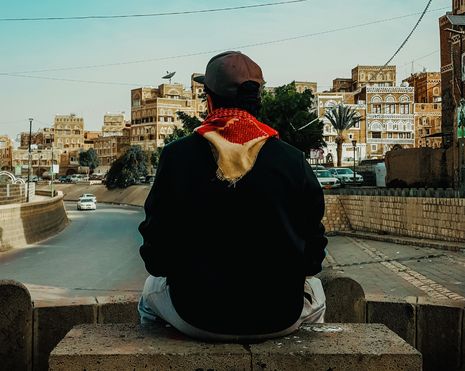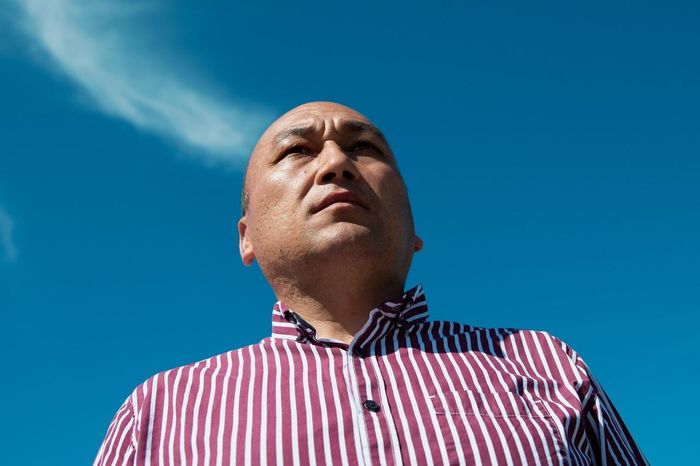I am a young person growing up in Yemen’s civil war. This is my story.
In the second instalment of our series spotlighting life in humanitarian crises, Victor Jack speaks with Yasser Ahmed, a 20-year old Yemeni student who describes the traumas, poverty and declining hope facing young people after six years of civil war

Content note: This article contains graphic mention of injury and war.
Yasser Ahmed is like any other 20-year old. He studies hard at university, hangs out with his friends and enjoys a good cycle. But as far back as he can remember, Yasser has lived under the shadow of civil war, described by the UN as the world’s “worst humanitarian crisis”.
On New Years Eve, the latest round of explosive shells came raining down on Yemen’s capital, Sanaa, thundering down across the city.
“This is Yemen,” says Yasser, “we are used to it”.
Six years since it began, the country is still reeling from a conflict which has seen more than 18,400 civilians killed, left two-thirds of the population in urgent need of food assistance – and claims the life of one child every 10 minutes due to preventable illnesses.
The struggle between the Houthi rebels – otherwise known as Ansar Allah – and the UN-recognised government led by President Abdrabbuh Mansur Hadi was set in motion by the Arab Spring in 2011. It escalated in 2015 when Saudi Arabia launched an intensive bombing campaign in support of Hadi.
Today, the Hadi coalition presides over South Yemen while Houthis dominate the North, including Sanaa. But the war is largely at a stalemate – with most fighting taking place between groups in the Hadi camp. The fighting has also grown increasingly complicated as foreign powers including the UAE are increasingly entangled in complex – and sometimes opposing – local alliances.
“Now sometimes you have to wait for three or four days for water.”
Yasser was 14 years old when the Houthis took control of the Sanaa. While he lost a year of education as the conflict forced schools to shut between 2015-2016, he is now in the first year of his undergraduate degree at one of Sanaa’s top universities.
“I cannot say if life was better before 2014 because we were children. But many things were here, like electricity, petrol and gas,” he says. “Now sometimes you have to wait for three or four days for water.”
Like an estimated 40% of Yemen’s population, his family’s primary source of income dried up when the conflict began, as his father lost his job in the tourist industry which has imploded.
Yet Yasser admits he is one of the lucky ones.
“Some Yemenis live a tough life, working more than 15 hours [a day], and it’s not enough for basic food,” he says.
While 13.5mn people in Yemen were faced with severe food shortages last year, Yasser’s family is able to purchase food largely due to support from remittances sent by his family in Turkey and the UK.
“There is enough food, but everyone cannot buy it. Only the rich can buy it, while poor people wait for NGOs to give them food.”
“While we were studying, you would hear bombs and suddenly they would stop teaching”
When the conflict first escalated, Yasser recounts how terrifying everyday life was.
“While we were studying, you would hear bombs and suddenly they would stop teaching”, he adds, remembering how students and teachers would then rush to take shelter somewhere in the school building.
“We were scared,” he says.
At the most intense point in the Saudi bombing effort in 2016, Yasser remembers losing a classmate. “One of the bombs got him,” he says. “They didn’t find his whole body – they found only parts, and that was it.”
“But now after years in the same war, we’ve become used to it,” Yasser argues. “We don’t react anymore.”
While life has returned to some degree of normality for Sanaa – and Saudi airstrikes have become scarcer – the war has taken its toll on the futures of young Yemenis. According to the World Bank, 24.5% of 15-24 year olds are unemployed, and Yasser argues the insecurity is pushing young people to emigrate en masse to Turkey and Saudi Arabia.
“The opportunities for young people decreased,” he says. “Young people in Yemen have their own projects – they are clever, they are smart, they can do many things – our country doesn’t own them.”
Where young people do find jobs, Yasser says, they are often menial and underpaid – receiving wages of around $50 a month.
They are also being pushed out by a culture that fails to appreciate or reward young people’s ambitions. “They don’t value you for the things you are doing,” he says, arguing he himself plans to pursue a Master’s degree in Turkey.
“There is no international response ... there is no justice”
“[But] if we lose them, we are damaging the city,” he admits, emphasising how reliant Sanaa is on the grassroots-community charity work done by its youth. “They should contain the young people”.
By now, Yasser argues, Yemenis have almost lost hope for a response from the international community.
“There is no international response,” he says, “there is no justice”.
Yasser believes Western countries should help rebuild Yemen – infrastructurally and with educational programmes, given the country’s huge shortages in necessary professions such as teachers.
Following President Joe Biden’s announcement earlier this month that the US would halt arms sales and support to the Saudi war effort, Yasser says he can only “hope” that Washington will follow through on its promises.
But he admits he struggles to understand how foreign countries – such as France and Canada – continue selling weapons deployed in airstrikes on Yemen. After a brief hiatus last year, the UK government too decided in July to restart selling arms to the Saudi coalition.
“We need help,” he says. “Like any normal person I hate weapons and hate people [supplying] them”.
Asked how young people at Cambridge can help, Yasser emphasises above all the “need to study the situation” in Yemen, and suggests following pages such as @yemensvoice, which aim to raise awareness of the conflict. He also praises the work of international organisations like UNICEF, which continue to work on the ground during the pandemic.
Like everywhere, last year was testing for Yemen, as Covid-19 put pressure on its collapsing healthcare system. But 2020 also further sharpened the country’s multiple crises, as travel restrictions obstructed international humanitarian work and locust swarms diminished food crops still further.
And while the physical conflict is now largely frozen, insufficient funding forced the UN to close more than 30% of its programmes in the country in 2020 – pushing Yemen to the brink of collapse.
“We hope it will finish and we can return to our normal life,” says Yasser, but admits his family is becoming increasingly resigned to the fact this may never happen.
“We are thinking about leaving Yemen, because we cannot lead a normal life”.
 News / Colleges charge different rents for the same Castle Street accommodation2 March 2026
News / Colleges charge different rents for the same Castle Street accommodation2 March 2026 News / King’s hosts open iftar for Ramadan3 March 2026
News / King’s hosts open iftar for Ramadan3 March 2026 Theatre / Lunatics and leisure centres 4 March 2026
Theatre / Lunatics and leisure centres 4 March 2026 News / Angela Merkel among Cambridge honorary degree nominees27 February 2026
News / Angela Merkel among Cambridge honorary degree nominees27 February 2026 News / News in Brief: waterworks, wine woes, and workplace wins 1 March 2026
News / News in Brief: waterworks, wine woes, and workplace wins 1 March 2026









